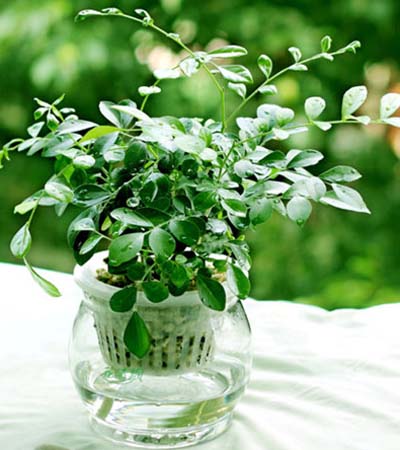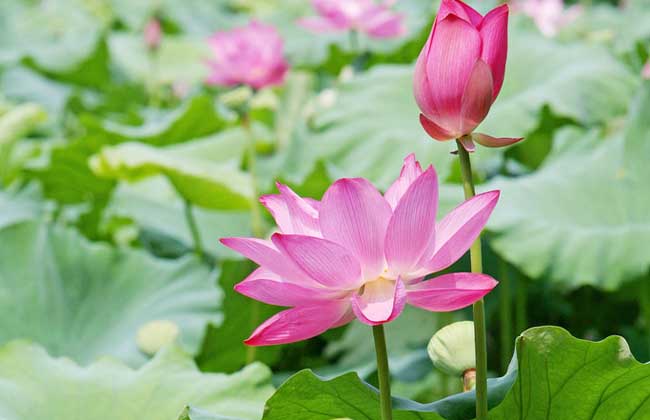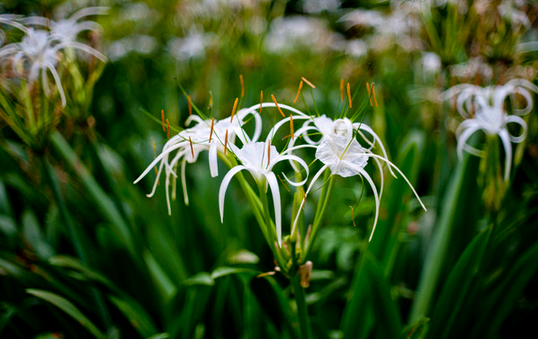How to choose hydroponic flowers and plants?
How to choose hydroponic flowers and plants? Hydroponic flowers are not aquatic flowers, it is a soilless cultivation method of flowers, flowers are cultivated in soilless nutrient solution, plants do not have aquatic structure, in the process of cultivation, we should often change water to supplement oxygen or increase oxygenation equipment.
Hydroponic flower culture is a new method of flower cultivation all over the world in recent years. At present, China, Japan, Singapore, the United States and Germany are vigorously promoting. The utility model has the advantages of cleanliness and sanitation, less diseases and insect pests, simple water replenishment and exchange, light weight, easy handling and so on. In addition, you can also use the changeable shape and color of hydroponic flowers to configure and layout at will, so as to achieve excellent artistic effect.
In order to watch flowers in hydroponics, we first need to choose the appropriate species, and we should pay attention to the selection and purchase of materials for hydroponic flowers.
The main results are as follows: (1) choose the flower species suitable for hydroponic culture. If you buy back a species that is not suitable for hydroponic cultivation, it will not be long before it will gradually die because of rotten roots.
(2) the flower species with strong cold resistance should be selected. Although some flowers are very suitable for hydroponic culture, they need a higher temperature to survive the winter, so it is difficult to survive the winter safely in ordinary families, and they are often easy to die from frost injury. Strong cold resistance, a little cold can pass the winter are: tortoise back bamboo, purple leaf duck grass, aloe, hanging orchid, dry umbrella grass, silver chrysanthemum, golden millet orchid, golden leopard, ivy, pocket coconut, palm bamboo and so on.
(3) choose the planting materials which have adapted to the conditions of hydroponics. Even if the flower species are suitable for hydroponic culture, they still have to go through a process of adaptation. Flowers that have adapted to hydroponic culture refer to plant materials that have been cultivated in water for a period of time and have adapted to hydroponic conditions, and grow normally, characterized by tall and straight branches and leaves, full and glossy leaves, and roots adapted to hydroponic conditions at the root or stem base. the above is the introduction of how to choose hydroponic flowers and plants.
What are the techniques of hydroponic flower culture
Hydroponic flowers are a kind of flowers with excellent ornamental nature. the upper flowers of hydroponic flowers are full of fragrance, and the fish below can also play at will, which is not only sanitary and environmentally friendly, but also very convenient, so hydroponic flowers are also called lazy flowers and are good helpers for home decoration. suitable for living room, bedroom, balcony, study and courtyard and other places. Today, what the editor shares with you is the introduction of hydroponic flowers and plants and some knowledge and skills of hydroponic flower culture.

What are the hydroponic flowers and plants-- introduction of varieties
1. Many common and unusual plants in our daily life can be hydroponically cultured, including green plants and beautiful flowers, carnation, asparagus, African chrysanthemum, tulips, calla lilies, banyan, Brazilian wood, hulk, tung tree, cyclamen, rose, gladiolus, orchid, evergreen, goose palm wood, hyacinth, chrysanthemum and some potted flowers. It can be said to be an excellent handicraft.
Second, flowers and plants that can be hydroponically cultured also include tortoise-backed bamboo, Milan, magnolia, camellia, jasmine, inverted golden bell, five-needle pine, Camellia, rubber banyan, Brazilian iron, rhododendron, golden wu, violets, Phalaenopsis, begonias, ferns, palms and so on. There are also some foliage plants that can be hydroponically cultivated, such as the lotus palm and hibiscus palm of the Sedum species, the tufted taro of the Araceae, the silver-wrapped taro, the fire crane flower, the hanging orchid of Guangdong, and more than 100 species of other species, such as Magnolia, crab claw orchid and so on.
Characteristics of hydroponic Flower plants
The appreciation of hydroponic flowers is very strong, not only with artistic vase shape, but also with white aquatic roots and different color substrates, and what is even more peculiar is that flowers and fish can be cultured together. Many kinds of ornamental effects, such as flowers, leaves, roots and fish, are integrated, and hydroponic flowers are cultured in water without soil, so there is little disease, insect pests and fungi and bacterial pollution. Water and nutrient management is also more convenient, maintenance is simple and does not need frequent watering, can play the effect of beautifying the space.
Culture techniques and matters needing attention of hydroponic Flowers
1. Hydroponic flowers cannot use metal containers when preparing nutrient solutions, let alone use them to store nutrient solutions. in order to be beautiful and conducive to the growth of plants and flowers, it is best to use glass, enamel and ceramic utensils as containers. and when preparing the nutrient solution, the water also needs to be paid attention to, if tap water is used, tap water should be treated to prevent harmful substances in the water from causing harm to plants. A small amount of humic acid compounds or sodium ethylenediamine tetraacetate need to be added.
2. when hydroponic flowers are cultivated in pots, the cultivation water in the pot generally needs to be changed once a month or two, and tap water can be used, but we must pay attention to the use of tap water for a period of time to keep the root temperature stable. And most hydroponic flowers are negative and neutral flowers suitable for indoor cultivation, and there are different requirements for light. The whole root or root mouth of hydroponic plants with proper light, temperature and nutrient solution concentration is white.
Conclusion: there are many kinds of hydroponic flowers, and they are highly ornamental, beautiful and generous. Transparent glass bottles are used in living rooms, bedrooms, balconies, studies and courtyards are very good decorations and handicrafts, which can not only add color to home life, but also highlight the unique taste of the host. The above is the editor's introduction to what hydroponic flowers and plants have and some knowledge and skills. I hope it can help friends who like hydroponic flowers.
What are the hydroponic flowers and plants? knowledge and skills of hydroponic flowers.
✤
Hydroponic flower is a kind of flower species with excellent ornamental nature. it mainly uses modern bioengineering technology and physical, chemical, biological and other engineering and scientific and technological means to domesticate ordinary plants and flowers so that they can grow in water for a long time. This is a new generation of high-tech agricultural project. The upper part of hydroponic flowers is full of fragrance, and the fish below can play freely, which is not only sanitary and environmentally friendly, but also very convenient. Therefore, hydroponic flowers, also known as lazy flowers, is a good helper for home decoration, suitable for living room, bedroom, balcony, study and courtyard and other places.
The characteristics of hydroponic flowers in ✤ hydroponic culture is very strong, not only with artistic vase shape, but also with white aquatic roots and different colors of matrix, what is more peculiar is that flowers and fish can be cultured together, integrating a variety of ornamental effects such as flowers, leaves, roots and fish, and hydroponic flowers are cultured in water without soil, so diseases, insect pests and fungi are rarely contaminated. Water and nutrient management is also more convenient, maintenance is simple and does not need frequent watering, can play the effect of beautifying the space.
What are the ✤ hydroponic flowers-Variety introduction 1. Many common and unusual plants in our daily life can be hydroponically cultivated, including general green plants and beautiful flowers, carnation, asparagus, African chrysanthemum, tulips, calla lilies, Mannan, Brazilian wood, Hulk, big rock tree, cyclamen, Chinese rose, gladiolus, orchid, evergreen, goose palm wood, hyacinth. The effect of hydroponic culture of chrysanthemum and some potted flowers is very good, which can be said to be excellent handicrafts. Second, flowers and plants that can be hydroponically cultured also include tortoise-backed bamboo, Milan, magnolia, camellia, jasmine, inverted golden bell, five-needle pine, Camellia, rubber banyan, Brazilian iron, rhododendron, golden wu, violets, Phalaenopsis, begonias, ferns, palms and so on. There are also some foliage plants that can be hydroponically cultivated, such as the lotus palm and hibiscus palm of the Sedum species, the tufted taro of the Araceae, the silver-wrapped taro, the fire crane flower, the hanging orchid of Guangdong, and more than 100 species of other species, such as Magnolia, crab claw orchid and so on.
Knowledge, skills and points for attention of ✤ hydroponic flowers 1. Hydroponic flowers can not use metal containers when preparing nutrient solution, let alone use it to store nutrient solution. In order to be beautiful and conducive to the growth of plants and flowers, it is best to use glass, enamel and ceramic utensils as containers, and the water should also be paid attention to when preparing nutrient solution. If tap water is used, tap water should be treated. To prevent harmful substances in water from causing damage to plants, it is necessary to add a small amount of humic acid compounds or sodium ethylenediamine tetraacetate. 2. when hydroponic flowers are cultivated in pots, the cultivation water in the pot generally needs to be changed once a month or two, and tap water can be used, but we must pay attention to the use of tap water for a period of time to keep the root temperature stable. And most hydroponic flowers are negative and neutral flowers suitable for indoor cultivation, and there are different requirements for light. The whole root or root mouth of hydroponic plants with proper light, temperature and nutrient solution concentration is white.
Conclusion: there are many kinds of hydroponic flowers, and they are highly ornamental, beautiful and generous. Transparent glass bottles are used in living rooms, bedrooms, balconies, studies and courtyards are very good decorations and handicrafts, which can not only add color to home life, but also highlight the unique taste of the host. The above is the editor's introduction to what hydroponic flowers and plants have and some knowledge and skills. I hope it can help friends who like hydroponic flowers.
- Prev

Seed sowing technique of potted lotus
Sowing techniques of potted lotus seeds: from July to August, lotus seeds mature and can be sowed with picking or sowing when the weather turns warm in April of the following year. 2. As the shell of the lotus seed is hard, the thick head of the lotus seed with microholes should be cut before sowing, but care should be taken not to hurt the lotus flesh.
- Next

How to raise Manjusri in the north?
Wenshu orchid is native to tropical Asia. Because it is not cold-resistant, it is cultivated in pots in the north. Although it can blossom in the north, it is difficult to seed, so it is generally adopted to plant and propagate tillering seedlings at the base of the stem. Like warm and humid climate, salt-resistant soil, avoid hot sun exposure in summer. Wenshulan has extensive management.
Related
- Fuxing push coffee new agricultural production and marketing class: lack of small-scale processing plants
- Jujube rice field leisure farm deep ploughing Yilan for five years to create a space for organic food and play
- Nongyu Farm-A trial of organic papaya for brave women with advanced technology
- Four points for attention in the prevention and control of diseases and insect pests of edible fungi
- How to add nutrient solution to Edible Fungi
- Is there any good way to control edible fungus mites?
- Open Inoculation Technology of Edible Fungi
- Is there any clever way to use fertilizer for edible fungus in winter?
- What agents are used to kill the pathogens of edible fungi in the mushroom shed?
- Rapid drying of Edible Fungi

